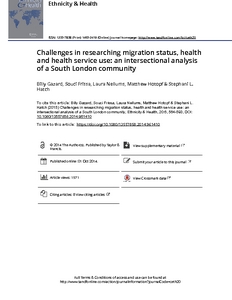Gazard, B; Frissa, S; Nellums, L; Hotopf, M; Hatch, SL
(2015)
Challenges in researching migration status, health and health service use: an intersectional analysis of a South London community.
Ethn Health, 20 (6).
pp. 564-593.
ISSN 1465-3419
https://doi.org/10.1080/13557858.2014.961410
SGUL Authors: Nellums, Laura Bruff
![[img]](https://openaccess.sgul.ac.uk/110114/1.hassmallThumbnailVersion/Challenges%20in%20researching%20migration%20status%20health%20and%20health%20service%20use%20an%20intersectional%20analysis%20of%20a%20South%20London%20community.pdf)  Preview |
|
PDF
Accepted Version
Available under License ["licenses_description_publisher" not defined].
Download (527kB)
| Preview
|
Abstract
OBJECTIVES: This study aimed to investigate the associations between migration status and health-related outcomes and to examine whether and how the effect of migration status changes when it is disaggregated by length of residence, first language, reason for migration and combined with ethnicity. DESIGN: A total of 1698 adults were interviewed from 1076 randomly selected households in two South London boroughs. We described the socio-demographic and socio-economic differences between migrants and non-migrants and compared the prevalence of health-related outcomes by migration status, length of residence, first language, reason for migration and migration status within ethnic groups. Unadjusted models and models adjusted for socio-demographic and socio-economic indicators are presented. RESULTS: Migrants were disadvantaged in terms of socio-economic status but few differences were found between migrant and non-migrants regarding health or health service use indicators; migration status was associated with decreased hazardous alcohol use, functional limitations due to poor mental health and not being registered with a general practitioner. Important differences emerged when migration status was disaggregated by length of residence in the UK, first language, reason for migration and intersected with ethnicity. The association between migration status and functional limitations due to poor mental health was only seen in White migrants, migrants whose first language was not English and migrants who had moved to the UK for work or a better life or for asylum or political reasons. There was no association between migration status and self-rated health overall, but Black African migrants had decreased odds for reporting poor health compared to their non-migrant counterparts [odds ratio = 0.15 (0.05-0.48), p < 0.01]. CONCLUSIONS: Disaggregating migration status by length of residence, first language and reason for migration as well as intersecting it with ethnicity leads to better understanding of the effect migration status has on health and health service use.
| Item Type: |
Article
|
| Additional Information: |
© 2014 The Author(s). Published by Taylor & Francis.
This is an Open Access article. Non-commercial re-use, distribution, and reproduction in any medium, provided the original work is properly attributed, cited, and is not altered, transformed, or built upon in any way, is permitted. The moral rights of the named author(s) have been asserted. |
| Keywords: |
UK, ethnicity, health, health service use, language use, migrant, Adult, Alcohol Drinking, Ethnic Groups, Female, Health Services, Health Services Accessibility, Health Status, Health Status Indicators, Humans, Language, London, Male, Mental Health, Middle Aged, Prevalence, Social Class, Transients and Migrants, Public Health, 1117 Public Health And Health Services, 1608 Sociology, 1702 Cognitive Science |
| SGUL Research Institute / Research Centre: |
Academic Structure > Infection and Immunity Research Institute (INII) |
| Journal or Publication Title: |
Ethn Health |
| ISSN: |
1465-3419 |
| Language: |
eng |
| Publisher License: |
Publisher's own licence |
| PubMed ID: |
25271468 |
| Dates: |
| Date |
Event |
| 2015 |
Published |
| 2014-10-01 |
Published Online |
| 2014-09-01 |
Accepted |
|
 |
Go to PubMed abstract |
| URI: |
https://openaccess.sgul.ac.uk/id/eprint/110114 |
| Publisher's version: |
https://doi.org/10.1080/13557858.2014.961410 |
Statistics
Item downloaded times since 05 Sep 2018.
Actions (login required)
 |
Edit Item |



